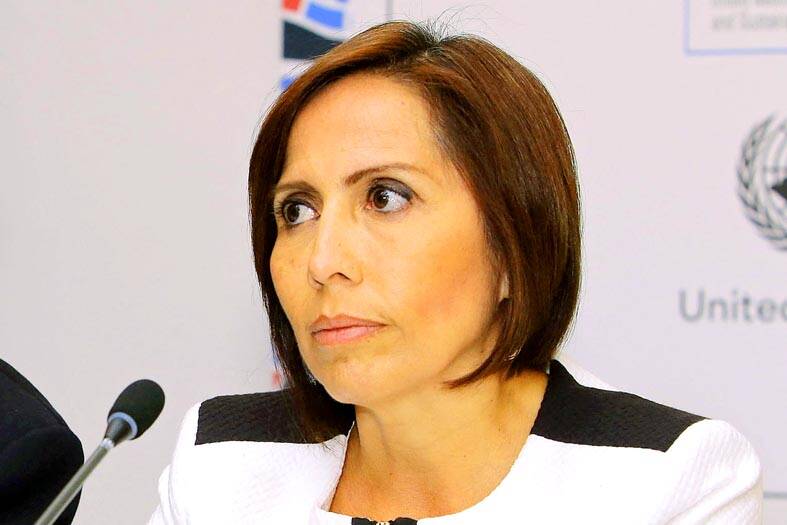The presidents of Argentina and Ecuador on Tuesday publicly criticized each other, in a growing diplomatic rift caused by the mysterious appearance in Venezuela of a convicted Ecuadoran ex-minister.
Maria de los Angeles Duarte, fleeing an eight-year sentence in Ecuador over bribery charges, had been holed up in Argentina’s mission in Quito since August 2020.
Argentina had offered asylum to Duarte, who served under former Ecuadoran president Rafael Correa, but Ecuador refused to grant her free passage out of the country.

Photo: AFP
On Tuesday last week, Argentina announced that Duarte had appeared at its mission in Caracas, but did not know how she had arrived there.
MUTUAL EXPULSION
The incident resulted in Ecuador expelling Argentina’s ambassador and recalling its own from Buenos Aires, measures Argentina then reciprocated.
In a Twitter post on Monday, Ecuadoran President Guillermo Lasso accused his Argentine counterpart of “putting his personal friendship and political identity” with Correa — who has also been found guilty of corruption — “ahead of the fraternal relationship between the peoples of Argentina and Ecuador.”
Correa, who was president from 2007 to 2017 and has been granted asylum in Belgium, on Tuesday attended a meeting of a human rights group in Buenos Aires.
Argentine President Alberto Fernandez responded on Tuesday by posting on Twitter a public letter addressed to Lasso, in which he defended his government’s actions and condemned the expulsion of its ambassador as “disproportionate.”
“The seriousness and injustice of that decision show that it is his [Lasso’s] excessive behavior that truly hurts the relationship between our peoples,” Fernandez wrote.
“In our embassy was a refugee who enjoyed full freedom of movement. Argentina had neither the duty of custody over her nor any capacity to limit her movements,” he said.
Lasso later released his own letter to Fernandez on Twitter, defending his decision to declare Argentina’s ambassador persona non grata and accusing the envoy of acting as a “political operator.”
“Collaborating in the escape of a fugitive from justice contributes to impunity, an evil that affects the entire region,” Lasso said.

Malaysia yesterday installed a motorcycle-riding billionaire sultan as its new king in lavish ceremonies for a post seen as a ballast in times of political crises. The coronation ceremony for Malaysia’s King Sultan Ibrahim, 65, at the National Palace in Kuala Lumpur followed his oath-taking in January as the country’s 17th monarch. Malaysia is a constitutional monarchy, with a unique arrangement that sees the throne change hands every five years between the rulers of nine Malaysian states headed by centuries-old Islamic royalty. While chiefly ceremonial, the position of king has in the past few years played an increasingly important role. Royal intervention was

X-37B COMPARISON: China’s spaceplane is most likely testing technology, much like US’ vehicle, said Victoria Samson, an official at the Secure World Foundation China’s shadowy, uncrewed reusable spacecraft, which launches atop a rocket booster and lands at a secretive military airfield, is most likely testing technology, but could also be used for manipulating or retrieving satellites, experts said. The spacecraft, on its third mission, was last month observed releasing an object, moving several kilometers away and then maneuvering back to within a few hundred meters of it. “It’s obvious that it has a military application, including, for example, closely inspecting objects of the enemy or disabling them, but it also has non-military applications,” said Marco Langbroek, a lecturer in optical space situational awareness at Delft

The Philippine Air Force must ramp up pilot training if it is to buy 20 or more multirole fighter jets as it modernizes and expands joint operations with its navy, a commander said yesterday. A day earlier US National Security Adviser Jake Sullivan said that the US “will do what is necessary” to see that the Philippines is able to resupply a ship on the Second Thomas Shoal (Renai Shoal, 仁愛暗沙) that Manila uses to reinforce its claims to the atoll. Sullivan said the US would prefer that the Philippines conducts the resupplies of the small crew on the warship Sierra Madre,

AIRLINES RECOVERING: Two-thirds of the flights canceled on Saturday due to the faulty CrowdStrike update that hit 8.5 million devices worldwide occurred in the US As the world continues to recover from massive business and travel disruptions caused by a faulty software update from cybersecurity firm CrowdStrike, malicious actors are trying to exploit the situation for their own gain. Government cybersecurity agencies across the globe and CrowdStrike CEO George Kurtz are warning businesses and individuals around the world about new phishing schemes that involve malicious actors posing as CrowdStrike employees or other tech specialists offering to assist those recovering from the outage. “We know that adversaries and bad actors will try to exploit events like this,” Kurtz said in a statement. “I encourage everyone to remain vigilant